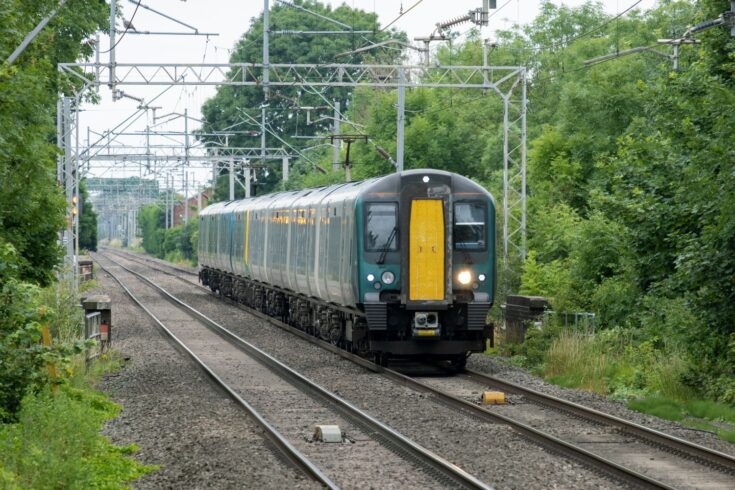Sustainable transport experts, Siemens Mobility Limited, are developing an innovative rapid-charging solution to support the use of electricity-powered train assets on non-electrified lines. To do this, they have partnered with a university, rail asset owners, and operators.
The UK rail industry is committed to decarbonisation. Replacing diesel trains with electric, hydrogen or battery bi-mode rolling stock is key to providing faster, smoother and more reliable journeys, as well as eliminating local pollution and greatly reducing emissions.
However, no fully-compliant, low-cost solution is currently available that can supply standard UK trains from the power cables running past stations and depots. Not without worsening power quality for nearby homes and business connected to the same cables. This limits the ability to provide electrification to charge battery or hydrogen bi-mode trains, thereby limiting their rollout. It also affects the safety and cost side of maintenance in and around train depots.
25kV Battery Train Charging Station Demonstration
The project was created to deliver a novel solution to this charging and power issue. It will enable simple installation of small, low-cost overhead line equipment (OLE) power supplies fed from existing standard local power supply cables, without affecting the power quality for the local area.
Crucially, the novel design of the product is compatible with all standard OLE-powered trains. It aims to accelerate and reduce the cost of decarbonisation of diesel passenger train routes across the UK. The solution also provides an opportunity to undertake safer, more efficient maintenance on tracks outside depots with the overhead line isolated, while the depot continues to prepare trains unaffected.
Power supply generated by the Rail Charging Converter (RCC) technology will be useful where the traditional electricity network has limitations. It will support decarbonisation through the replacement of diesel trains with battery or electric-powered stock. Replacing diesel trains in this way has a real impact on the level of carbon dioxide and wider pollution going into the environment from the rail industry as a whole.
The project scope
The project is led by Siemens Mobility Limited, alongside the University of York, Network Rail and a number of operating companies. It aims to take the next steps to demonstrate the capabilities and feasibility of the technology behind this game-changing power supply solution.
Siemens Mobility Limited has already completed several years of research and development for the prototype of the core power technology. The project now provides an opportunity to progress its potential use within UK train depots and charging stations. Market engagement work and feasibility studies were completed to understand and optimise designs to suit the needs of operating companies and infrastructure. As well as considering the best locations for a practical and low-cost solution to be most effective.
Finally, the project completed a range of system modelling and analysis of a challenging diesel-operated route. This demonstrated the benefits of the battery concept and its ability to improve journey times and decarbonise rail routes with its introduction.
World-leading railway power technology
Speaking on the benefits of the ‘First of a Kind’ (FOAK) initiative, Pratik Gondhiya, Senior Design Engineer at Siemens Mobility Limited, said:
The FOAK process has provided an impetus for the development of the prototype demonstration and its integration into a complete containerised solution that can be delivered through our existing UK manufacturing supply chain. Having DfT and Innovate UK support throughout has also helped to develop our partnership with University of York that we aim to grow further to create a centre of world-leading railway power technology.
What happened next
The project completed the first phase of activity under the FOAK initiative. It has now moved to the next stage of the manufacture and delivery of the first fully installed RCC technology onto the UK railway network.
With Siemens Mobility Limited’s partnership with the University of York strengthened by the collaboration, the creation of a design centre for the electrification converter technology is now underway in York.
About the funding
The project forms part of the FOAK demonstrator initiative. FOAK aims to accelerate innovation in the UK rail sector and enable new technology to be readily and efficiently integrated into the railway system. This project was successful under the ‘low emissions and a greener railway’ funding theme.
The FOAK initiative is intended to support innovation solutions at high technology readiness levels in their route to market, and deliver scalable rail solutions that lead to deployment and real-world demonstrations. FOAK is a Small Business Research Initiative competition funded by the Department for Transport (DfT).
FOAK is funded by DfT and delivered in partnership with Innovate UK. As part of the FOAK 2022 initiative, over £6 million was allocated to 24 projects from across the UK. This helped to deliver demonstrations and feasibility studies to tackle key challenges within the sector.
This project is just one example of how Innovate UK and its partners are investing to realise the vision for rail in the Transport Vision 2050 strategy document. The strategy document sets out what the UK transport system may look like in 2050, and outlines the likely steps along the way to achieving this. Innovate UK and its partners are currently investing around £700 million in the current three-year spending review period in transport programmes covering the pathways set out in the Transport Vision document.
Top image: Credit: ChrisHepburn, iStock, Getty Images Plus via Getty Images

